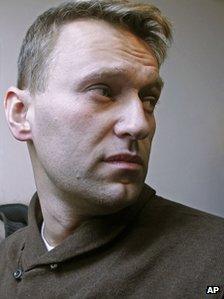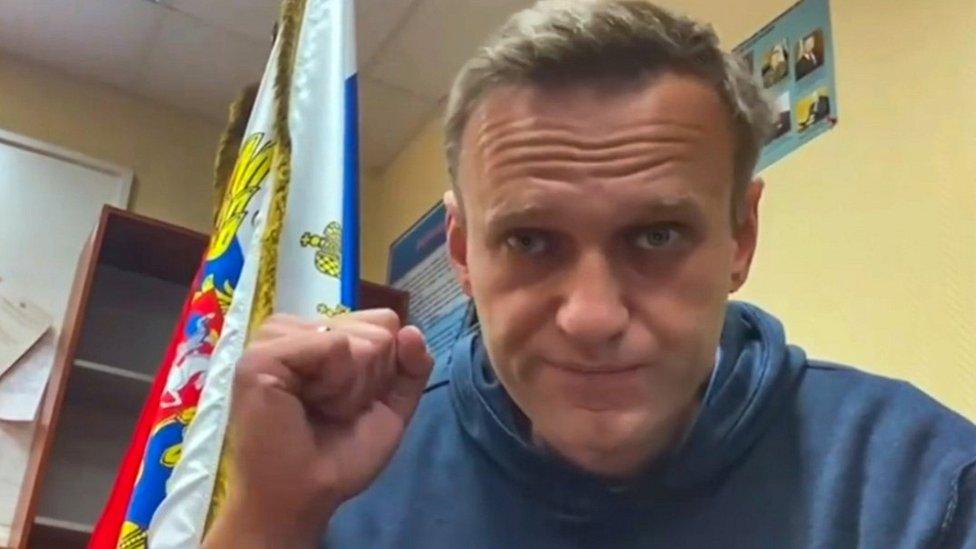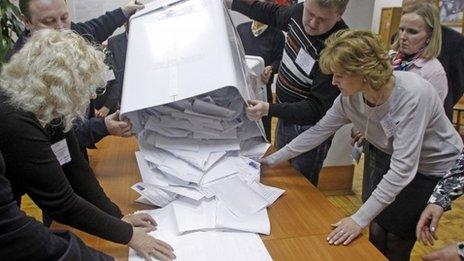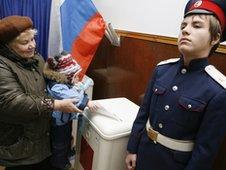Russia election: Protesters defy rally ban in Moscow
- Published
Veteran liberal politician Boris Nemtsov is arrested
Russian protesters defying a ban on unapproved rallies have faced off with supporters of Prime Minister Vladimir Putin in Moscow city centre.
Protesters chanted slogans against the ruling party as the Putin loyalists beat drums and chanted "Putin, Russia".
Police arrested at least 250 protesters, including veteran liberal politician Boris Nemtsov.
A rally on Monday against alleged fraud in Sunday's parliamentary elections was Moscow's biggest protest in years.
Mr Putin has played down losses by his party, United Russia, which won but with just under 50% of the vote, a sharp drop in its support.
Correspondents say the result reflects Mr Putin's declining popularity ahead of his bid for the Russian presidency in March.
EU Foreign Policy Chief Catherine Ashton acknowledged the election was well-prepared and administered, but said reports of procedural violations "are however of serious concern".
She pointed specifically to an alleged "lack of media impartiality, a lack of separation between party and state, and the harassments of independent monitoring attempts".
Observers from the Organisation for Security and Co-operation in Europe (OSCE) had earlier said the election was slanted in favour of the United Russia party.
Navalny jailed
Live video from Moscow's Triumphal Square, on a major road artery close to the Kremlin, showed crowds of rival demonstrators shouting slogans on Tuesday evening.
Eyewitnesses said up to 500 protesters took part, facing a much larger group of Putin supporters from United Russia and the Nashi youth movement.
Footage from the scene was broadcast over the internet by the Russian citizen journalism outlet Ridus (audio in Russian), external, and was still being followed by at least 30,000 viewers hours after the rally.
According to an Associated Press reporter, two fireworks were thrown at a crowd of Putin supporters. It was not immediately clear who had thrown them or if they had caused any injuries, the agency said, correcting an initial reference to "fire bombs".
Police said that at least 250 people were detained, while Russian news agencies reported that around 200 protesters were arrested in Russia's second city St Petersburg and 25 in the southern city of Roston-on-Don.
Correspondents say Mr Nemtsov and other protesters were hauled off to waiting police vehicles. Mr Nemstov was reportedly later released.
Monday's protest in Moscow drew several thousand people and police made at least 300 arrests. At least 50 arrests were made in St Petersburg.
Two of those arrested in Moscow were well-known anti-corruption blogger Alexei Navalny and Ilya Yashin, leader of the Solidarity party. They were jailed for 15 days on Tuesday for their part in the protests.
Their arrest was heavily tweeted by Russian bloggers, who circulated photos of Mr Navalny and others in custody.
"There is not a single doubt that my case is under the special control of the party of crooks and thieves," he told reporters in court ahead of being charged, referring to United Russia.
'Inevitable losses'
The Russian interior ministry has denied any extra security measures in Moscow, saying that police and troop movements in the city were a "rotation".
Its press service told Interfax that 51,500 police including 2,000 interior troops had been on a state of alert since 1 December, as part of election preparations.

Alexei Navalny is one of Russia's most popular bloggers
"Statements that extra forces are being drafted into Moscow do not correspond to reality," it said.
Speaking to United Russia officials in Moscow earlier on Tuesday, Mr Putin suggested that electoral losses were inevitable for any party in power.
"Yes, there were losses and they are inevitable," the prime minister and former two-term president said, quoted by Russian news agencies.
"They are inevitable for any political force, especially for one which, not for the first year, bears the brunt of responsibility for the situation in the country."
Mr Putin also rejected the accusation by Mr Navalny and others that his party was especially corrupt.
"This is a label applied not to a specific political party but to authorities [in general]," he said, promising to tackle the issue.
- Published16 February 2024

- Published5 December 2011

- Published6 March 2012
